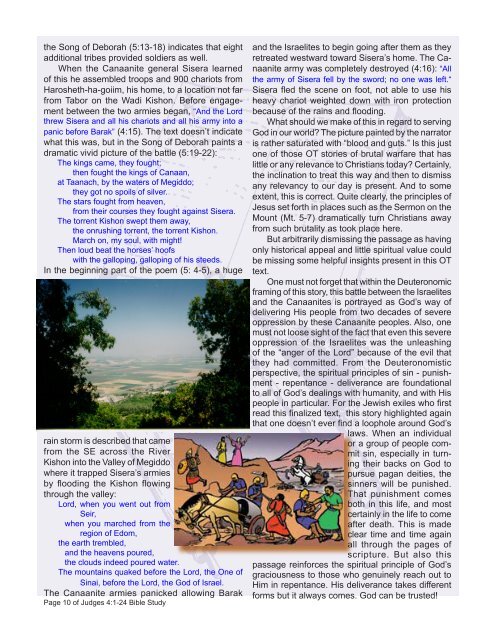Deborah the deliverer - Lorin
Deborah the deliverer - Lorin
Deborah the deliverer - Lorin
Create successful ePaper yourself
Turn your PDF publications into a flip-book with our unique Google optimized e-Paper software.
<strong>the</strong> Song of <strong>Deborah</strong> (5: 3- 8) indicates that eight<br />
additional tribes provided soldiers as well.<br />
When <strong>the</strong> Canaanite general Sisera learned<br />
of this he assembled troops and 900 chariots from<br />
Harosheth-ha-goiim, his home, to a location not far<br />
from Tabor on <strong>the</strong> Wadi Kishon. Before engagement<br />
between <strong>the</strong> two armies began, “And <strong>the</strong> Lord<br />
threw Sisera and all his chariots and all his army into a<br />
panic before Barak” (4:15). The text doesn’t indicate<br />
what this was, but in <strong>the</strong> Song of <strong>Deborah</strong> paints a<br />
dramatic vivid picture of <strong>the</strong> battle (5: 9-22):<br />
The kings came, <strong>the</strong>y fought;<br />
<strong>the</strong>n fought <strong>the</strong> kings of Canaan,<br />
at Taanach, by <strong>the</strong> waters of Megiddo;<br />
<strong>the</strong>y got no spoils of silver.<br />
The stars fought from heaven,<br />
from <strong>the</strong>ir courses <strong>the</strong>y fought against Sisera.<br />
The torrent Kishon swept <strong>the</strong>m away,<br />
<strong>the</strong> onrushing torrent, <strong>the</strong> torrent Kishon.<br />
March on, my soul, with might!<br />
Then loud beat <strong>the</strong> horses’ hoofs<br />
with <strong>the</strong> galloping, galloping of his steeds.<br />
In <strong>the</strong> beginning part of <strong>the</strong> poem (5: 4-5), a huge<br />
rain storm is described that came<br />
from <strong>the</strong> SE across <strong>the</strong> River<br />
Kishon into <strong>the</strong> Valley of Megiddo<br />
where it trapped Sisera’s armies<br />
by flooding <strong>the</strong> Kishon flowing<br />
through <strong>the</strong> valley:<br />
Lord, when you went out from<br />
Seir,<br />
when you marched from <strong>the</strong><br />
region of Edom,<br />
<strong>the</strong> earth trembled,<br />
and <strong>the</strong> heavens poured,<br />
<strong>the</strong> clouds indeed poured water.<br />
The mountains quaked before <strong>the</strong> Lord, <strong>the</strong> One of<br />
Sinai, before <strong>the</strong> Lord, <strong>the</strong> God of Israel.<br />
The Canaanite armies panicked allowing Barak<br />
Page 0 of Judges 4: -24 Bible Study<br />
and <strong>the</strong> Israelites to begin going after <strong>the</strong>m as <strong>the</strong>y<br />
retreated westward toward Sisera’s home. The Canaanite<br />
army was completely destroyed (4: 6): “All<br />
<strong>the</strong> army of Sisera fell by <strong>the</strong> sword; no one was left.“<br />
Sisera fled <strong>the</strong> scene on foot, not able to use his<br />
heavy chariot weighted down with iron protection<br />
because of <strong>the</strong> rains and flooding.<br />
What should we make of this in regard to serving<br />
God in our world? The picture painted by <strong>the</strong> narrator<br />
is ra<strong>the</strong>r saturated with “blood and guts.” Is this just<br />
one of those OT stories of brutal warfare that has<br />
little or any relevance to Christians today? Certainly,<br />
<strong>the</strong> inclination to treat this way and <strong>the</strong>n to dismiss<br />
any relevancy to our day is present. And to some<br />
extent, this is correct. Quite clearly, <strong>the</strong> principles of<br />
Jesus set forth in places such as <strong>the</strong> Sermon on <strong>the</strong><br />
Mount (Mt. 5-7) dramatically turn Christians away<br />
from such brutality as took place here.<br />
But arbitrarily dismissing <strong>the</strong> passage as having<br />
only historical appeal and little spiritual value could<br />
be missing some helpful insights present in this OT<br />
text.<br />
One must not forget that within <strong>the</strong> Deuteronomic<br />
framing of this story, this battle between <strong>the</strong> Israelites<br />
and <strong>the</strong> Canaanites is portrayed as God’s way of<br />
delivering His people from two decades of severe<br />
oppression by <strong>the</strong>se Canaanite peoples. Also, one<br />
must not loose sight of <strong>the</strong> fact that even this severe<br />
oppression of <strong>the</strong> Israelites was <strong>the</strong> unleashing<br />
of <strong>the</strong> “anger of <strong>the</strong> Lord” because of <strong>the</strong> evil that<br />
<strong>the</strong>y had committed. From <strong>the</strong> Deuteronomistic<br />
perspective, <strong>the</strong> spiritual principles of sin - punishment<br />
- repentance - deliverance are foundational<br />
to all of God’s dealings with humanity, and with His<br />
people in particular. For <strong>the</strong> Jewish exiles who first<br />
read this finalized text, this story highlighted again<br />
that one doesn’t ever find a loophole around God’s<br />
laws. When an individual<br />
or a group of people commit<br />
sin, especially in turning<br />
<strong>the</strong>ir backs on God to<br />
pursue pagan deities, <strong>the</strong><br />
sinners will be punished.<br />
That punishment comes<br />
both in this life, and most<br />
certainly in <strong>the</strong> life to come<br />
after death. This is made<br />
clear time and time again<br />
all through <strong>the</strong> pages of<br />
scripture. But also this<br />
passage reinforces <strong>the</strong> spiritual principle of God’s<br />
graciousness to those who genuinely reach out to<br />
Him in repentance. His deliverance takes different<br />
forms but it always comes. God can be trusted!
















